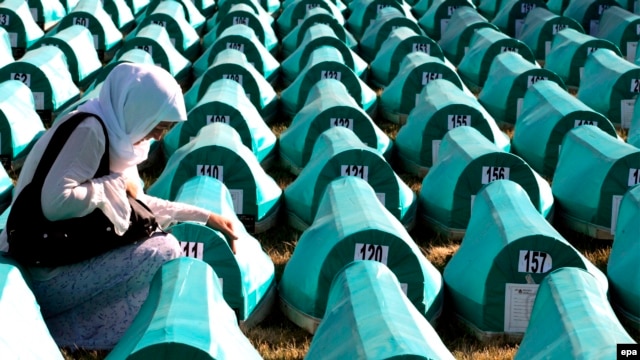Bosnia: UN officials use 'G-word' to describe Srebrenica massacre
| Publisher | Radio Free Europe/Radio Liberty |
| Publication Date | 2 July 2015 |
| Cite as | Radio Free Europe/Radio Liberty, Bosnia: UN officials use 'G-word' to describe Srebrenica massacre, 2 July 2015, available at: https://www.refworld.org/docid/55b5f44711.html [accessed 22 May 2023] |
| Disclaimer | This is not a UNHCR publication. UNHCR is not responsible for, nor does it necessarily endorse, its content. Any views expressed are solely those of the author or publisher and do not necessarily reflect those of UNHCR, the United Nations or its Member States. |
July 02, 2015
By RFE/RL
 A Bosnian Muslim woman mourns over a casket at the Potocari Memorial Center during the 2008 burial of 308 Bosnian Muslims killed by Bosnian Serb forces in Srebrenica.
A Bosnian Muslim woman mourns over a casket at the Potocari Memorial Center during the 2008 burial of 308 Bosnian Muslims killed by Bosnian Serb forces in Srebrenica.
Russia and its Balkan allies may find it offensive to use the word genocide to describe the massacre of thousands at Srebrenica during the Bosnian war, but few others at the United Nations hesitate to do so.
In General Assembly debate July 1 over a resolution commemorating the 20th anniversary of the killing of more than 8,000 Bosnian Muslim men and boys, who were then dumped into an open pit in Europe's worst mass killing since World War II, Secretary-General Ban Ki-moon unapologetically used the word genocide.
So did Serge Brammertz, the head of a UN tribunal prosecuting the perpetrators, and U.S. Ambassador Samantha Power, who was in Bosnia as a freelance journalist at the time of the mass killings in July 1995.
"Those who deny the genocide in Srebrenica today only embarrass and humiliate themselves," said Power. She urged that "the resolve induced by the horror of Srebrenica be extended not only to commemorating the past, but to do far more to prevent genocide and mass atrocities in the present."
But it was Abisada Dudic who brought tears to bystanders when she addressed the semantical issue after relating how she fled her home near Srebrenica as a child with memories of "fear, bloodshed and fire." Her family's hope is that the remains of loved ones will be found, including an uncle last seen running into the forest to escape the Srebrenica slaughter.
Said Dudic: "Calling what happened in Srebrenica by any name other than genocide, be it massacre, tragedy, catastrophe, whatever else, not only thwarts the possibility of reconciliation, it bolsters those denying the genocide and leading the secession efforts" by Bosnian Serbs.
"It trivializes the pain and suffering of genocide victims. It re-victimizes the survivors, and it minimizes the enormity of the crime," she said.
Bosnia's UN Ambassador Mirsada Colakovic, who presided over the commemoration, called denial "the last stage of genocide."
It's "a kind of double-killing in which the victims are first murdered, then the memory of the horrible deeds themselves is being destroyed," she said.
The UN commemoration took place against a backdrop of intense opposition from Russia, Bosnian Serbs, and Serbia to any mention of genocide in a UN Security Council resolution marking the 20th anniversary of the Srebrenica killings.
Serbia's Prime Minister Aleksandar Vucic has called it "a big, horrific crime," but refuses to call it a genocide.
Britain has circulated a draft resolution that "condemns in the strongest terms the genocide in Srebrenica." It recalls that the Yugoslav war crimes tribunal in 2004 and the International Court of Justice in 2007 both determined that the mass killings were acts of genocide.
Britain's UN Ambassador Matthew Rycroft, a former envoy to Bosnia, told the packed chamber that the UN's failure to protect innocent civilians in what had been designated as a UN safe area "still haunts this organization."
He said the resolution that the Security Council will consider next week doesn't seek "to bring up painful divisions nor point the finger of blame." It will commemorate the victims, show solidarity with survivors, and call for reconciliation, Rycroft said.
Russia, however, which has close ties to Serbia, has circulated a rival draft resolution which doesn't mention either Srebrenica or genocide.
Russia's Deputy UN Ambassador Petr Iliichev June 30 called the British resolution "divisive," saying it focuses on "only one part of the conflict."
The Russian draft, he said, is "more general, more reconciling." In its text, the Russian resolution condemns "the most serious crimes of concern to the international committee" in what appears to be its strongest language.
With reporting by AP and Reuters
Link to original story on RFE/RL website
